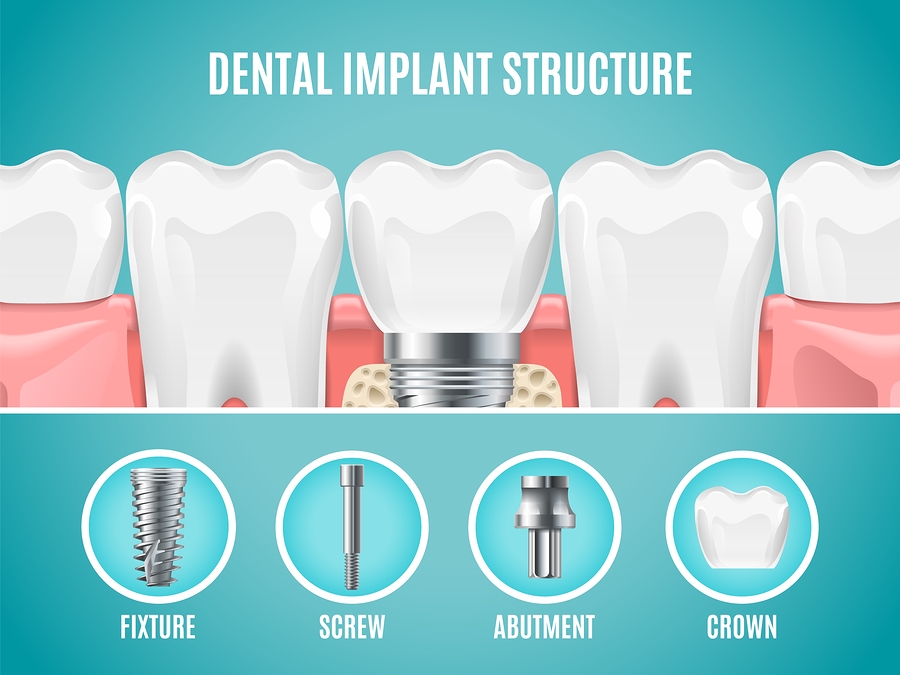Dental Sense Fundamentals Explained
Dental Sense Fundamentals Explained
Blog Article
The Basic Principles Of Dental Sense
Table of ContentsThe Greatest Guide To Dental SenseAll About Dental SenseSome Ideas on Dental Sense You Need To KnowThe Best Guide To Dental Sense
are medical gadgets surgically implanted into the jaw to recover a person's ability to eat or their appearance. They give assistance for synthetic (phony) teeth, such as crowns, bridges, or dentures. When a tooth is lost due to injury or illness, an individual can experience problems such as quick bone loss, defective speech, or modifications to chewing patterns that result in pain.Oral dental implant systems include a dental implant body and dental implant joint and may likewise include an abutment addiction screw. Root canal procedure. The oral implant body is surgically inserted in the jawbone in area of the tooth's origin. The oral implant joint is typically connected to the dental implant body by the abutment fixation screw and extends with gums right into the mouth to sustain the affixed fabricated teeth
(https://www.awwwards.com/dentalsense1/)Framework of The Oral Implant System picking dental implants, talk with your oral provider concerning the potential advantages and threats, and whether you are a prospect for the treatment. Points to take into consideration: Your total wellness is an important consider figuring out whether you are a great prospect for oral implants, the length of time it will require to heal, and for how long the implant may remain in location.
Cigarette smoking may influence the healing process and lower the long-lasting success of the implant. The healing procedure for the implant body may take a number of months or longer, throughout which time you typically have a momentary joint in place of the tooth. the oral implant procedure: Thoroughly comply with the oral health instructions given to you by your dental service provider.
Not known Factual Statements About Dental Sense
Implant failing can result in the requirement for an additional surgery to fix or change the implant system. Recovers the capability to eat Brings back cosmetic look Aids keep the jawbone from diminishing due to bone loss Protects the health of the bordering bone and periodontals Aids maintain surrounding (neighboring) teeth secure Enhances lifestyle Damages to surrounding natural teeth during implant positioning Injury to the surrounding cells throughout surgical procedure, such as sinus opening Injury during surgical treatment (as an example, crack of surrounding jawbone) Insufficient function, such as seeming like the teeth do not attack together typically A feeling that the tooth hangs or turning in position resulting from a joint screw loosening Implant body failure (looseness of the implant body) as a result of systemic infection, which might be more most likely in clients with uncontrolled diabetics issues because of neighborhood infection in bone and periodontals supporting the dental implant body as a result of delayed recovery, which might be most likely in people who smoke Difficulty cleaning up the gum tissues around the dental implant, resulting in bad oral health Unattended gum illness Post-surgical tingling as a result of nerve impingement or damages Constantly inform healthcare suppliers and imaging professionals that you have dental implants before any kind of magnetic resonance imaging (MRI) or x-ray treatments.
FDA is not knowledgeable about any negative occasions reported for MRI or x-ray treatments with dental implants. Dental implants systems are commonly made from products that follow global agreement requirements of the International Organization for Standardization (ISO) or ASTM International. These standards have information of what makes a risk-free material.

An oral implant is a framework that replaces a missing out on tooth. With screw-like devices, the surgeon inserts an implant right into the jawbone, and it acts as a support for a man-made tooth, called a crown.
Some Ideas on Dental Sense You Should Know
Some people are not eligible for dental implant surgical procedure. It is for oral doctors to operate individuals with: severe illnessuncontrollable metabolic diseasebone or soft cells disease or infectionIf these concerns are solved, a person can have the surgery. In, dental surgeons refrain from running on people with: If people with any of the above undergo oral implant surgery, there is a higher risk of the implant falling short.

Oral implant surgical treatment is a customized process. It's not the very same for every person. Yet the complying with offers a basic overview of what you can expect your dental practitioner, dental doctor, periodontist or prosthodontist to do: Put the implant operatively. Offer you time to heal. Connect the post and final crown, bridge or denture.
Next off, your doctor will thoroughly place the dental implant right into your jaw. If your implant is near the front of your mouth, your dental expert will make a momentary tooth for you to wear up until you heal.
Not known Facts About Dental Sense
During the recovery stage, your jawbone ought to fuse to the dental implant. This process can take anywhere from 3 to 9 months.
Once your dental implant heals, your dental expert can attach the joint (little port article) and your last restoration (crown, my response bridge or denture). This usually takes concerning one hour to finish and might call for a 2nd minor surgical procedure. You should not feel any kind of pain throughout your dental implant procedure due to the fact that your service provider will certainly utilize medicine to numb your gums.
Report this page